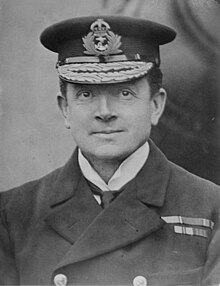Somerset Gough-Calthorpe
| Sir Somerset Gough-Calthorpe | |
|---|---|

Sir Somerset Gough-Calthorpe
|
|
| Born | 23 December 1865 London, England |
| Died |
27 July 1937 (aged 71) Ryde, Isle of Wight |
| Allegiance | United Kingdom |
| Service/branch | Royal Navy |
| Years of service | 1878–1930 |
| Rank | Admiral of the Fleet |
| Commands held |
Portsmouth Command Mediterranean Fleet Coastguard and Reserves 2nd Cruiser Squadron HMS Dreadnought HMS Hindustan HMS Roxburgh HMS Pandora HMS Halcyon |
| Battles/wars |
Fourth Anglo-Ashanti War First World War |
| Awards |
Knight Grand Cross of the Order of the Bath Knight Grand Cross of the Order of St Michael and St George Commander of the Royal Victorian Order |
Admiral of the Fleet Sir Somerset Arthur Gough-Calthorpe GCB, GCMG, CVO (23 December 1865 – 27 July 1937), sometimes known as Sir Somerset Calthorpe, was a Royal Navy officer and a member of the Gough-Calthorpe family. After serving as a junior officer during the Fourth Anglo-Ashanti War, he became naval attaché observing the actions of the Imperial Russian Navy during the Russo-Japanese War and then went on to command an armoured cruiser and then a battleship during the early years of the 20th century.
During the First World War Gough-Calthorpe initially served as commander of the 2nd Cruiser Squadron of the Grand Fleet, then became Second Sea Lord and after that became Admiral commanding the Coastguard and Reserves. In the closing years of the War he served as Commander-in-Chief of the Mediterranean Fleet, in which capacity he signed the Armistice of Mudros on behalf of all the Allies, by which the Ottoman Empire accepted defeat and ceased hostilities. The Occupation of Constantinople began with the Allied fleet entering Constantinople in November 1918 and it was Gough-Calthorpe's flagship, HMS Superb, that led the way.
...
Wikipedia
